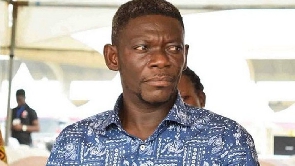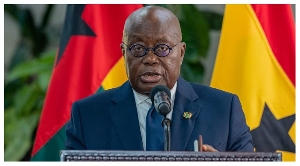- Home - News
- TWI News | TV
- Polls
- Year In Review
- News Archive
- Crime & Punishment
- Politics
- Regional
- Editorial
- Health
- Ghanaians Abroad
- Tabloid
- Africa
- Religion
- Election 2020
- Coronavirus
- News Videos | TV
- Photo Archives
- News Headlines
- Press Release
General News of Tuesday, 23 May 2000
Source: GNA
Develop policies and infrastructure for globalisation - Aryeetey
Accra, May 23, GNA - Professor Ernest Aryeetey, Deputy Director of the Institute of Statistical, Social and Economic Research (ISSER) said on Tuesday that Africa must develop and pursue the right policies in order to be active participants of globalisation.
Prof Aryeetey, who was delivering a lecture as part of ISSER's millennium seminars in Accra, noted that Africa risks being marginalised, if it continues to detach itself from global economic trends. He spoke on the theme, "Asia and Africa in the Global Economy: Economic Policies and External Performance in Southeast Asia and Sub-Saharan Africa."
Tracing performance of Africa's economies from the early 1990s, Prof Aryeetey said, "the weak foundation of many economies can be more vividly shown in their modes of international linkages.
"Failure to diversify exports and foreign direct investments (FDI) has left the continent virtually by-passed by the dynamic forces that have swept the international trading and financial systems with the aid of advanced information and telecommunication technology."
Over the past three decades average annual growth of exports for selected countries in the two regions have shown pronounced divergent performance. While the export of goods and services grew by only 1.9 per cent in 1980-90 and by 2.5 per cent in 1990-95 in Sub-Saharan Africa (SSA), Southeast Asia recorded higher figures.
That region's export growth was 8.8 per cent in the earlier period and 13.5 per cent in the latter period. On the manufacturing sector, Prof Aryeetey said a number of South East Asian economies managed to move from being primary exporters in the 1960s and 70s to become major exporters of manufactured goods.
Indonesia, Malaysia and Thailand raised the share of manufactured exports from less than six per cent in 1965 to 41 per cent, 61 per cent and 77 per cent in 1992 in that order. "For the period of 1980-1995, these three economies sustained the average growth rate of manufacturing exports in an impressive range of nine to 13 per cent per annum.
"In contrast, the share of manufactured exports for SSA countries hardly changed from seven per cent in 1965 and eight per cent in 1990," he noted. Prof. Aryeetey said in the face of obvious problems with external sectors, SSA governments refused to adjust exchange rates through devaluation.
As currencies throughout the region became overvalued, they began to hurt exports directly and by the beginning of the 1980s, black marketing of currencies began to thrive.
However, not wanting to adjust exchange rates, SSA countries effectively limited their participation in world trade. Imports suffered immensely, often leading to severe shortages of basic consumer items and the lack of inputs for the state owned enterprises.
"This often meant they had to administer at great expense domestic prices while some governments were prepared to do this so long as it helped to contain the agitation of likely opponents."
As a way forward, Prof Aryeetey proposed that Africa's trade liberalisation policies should be designed in the light of practicalities and in the context of a forward-looking industrialisation strategy.
"Emphasis should be placed on pacing, sequencing and phasing of trade liberalisation policies" Prof Aryeetey said, adding that, these have an important bearing in sustainability of reforms.
In pursuing these measures, there is the need to have a sustainable export revenue base in order to avoid recurrent balance of payment crisis. He called for the institution of export promotion policies at an early stage before development of import liberalisation policies such as pertains in Brazil.
Prof. Aryeetey also called for a new "regionalism of Africa" which he said, must go beyond trade liberalisation to embrace the regionalisation of capital markets and infrastructural development for the export market. "Such infrastructural developments, if pursued alongside other policies, could go a long way to assist in various forms, in times of crisis."
The Deputy Director said interventions to protect the industrial sector must also be selective to attract industrial development and enhance competition with the developed world.
Contributions from participants at the seminar, including Mr Peter Harold, Country Director of the World Bank in Ghana, laid emphasis on the need to promote industrialisation alongside the export of primary commodities.
"Their revival must be linked with industrialisation." They also stressed the need for Africa to promote peace and stability while at the same time conscientising her people on the essence of globalisation, even at the basic level, in order for every one to contribute his or her quota.










